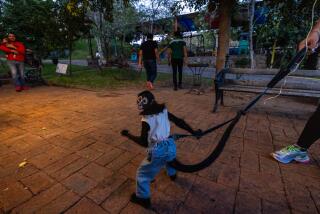Colombian taps into beetle-mania
- Share via
TUNJA, COLOMBIA — Cooing softly in baby talk, German Viasus gently uses a toothbrush to bathe the little animal he has raised since infancy and then pampers it with a fresh meal of mango, bananas and melon. The object of his affection? A beetle the size of a hamster with a hard, shiny shell and 2-inch-long horns.
Viasus, 36, is a Colombian entrepreneur who is exploiting the beetle-mania sweeping Japan by raising and exporting hundreds of the creepy-crawlies every month.
He has become a fearless (in more ways than one) pioneer of Colombia’s somewhat belated effort to promote the legal exploitation of its biodiversity, a stunning variety of plant and animal species that is second only to Brazil’s.
Despite its natural riches, Colombia produces only about $17 million in “bio-commerce” a year, mainly in native foliage used in floral arrangements and aromatic, medicinal and cosmetic herbs, said Jose Andres Diaz, a consultant to Colombia’s equivalent of the U.S. Environmental Protection Agency. That’s only a quarter of what neighboring Peru exports, he said.
In a bid to catch up, Colombia’s Environment Ministry recently set up a $1-million bio-commerce fund to make loans to businesses such as Viasus’ Terra Viva that pursue “green” markets. Among other recipients: organic coffee growers near Santa Marta and a group of women in Cali who raise butterfly larvae and sell them mainly to wedding planners and collectors in the United States.
Lucrative trade
Viasus seems to feel as much affection for the insects as do his Asian clients, possibly because his business, which is approved by both Colombian and Japanese governments, is so lucrative. He ships 300 giant beetles a month that retail for as much as $350 each in Tokyo pet stores.
“The beetles have a personality and know those of us who take care of them,” Viasus said. “They are calm around us, but like dogs they get nervous around strangers or if they think someone is going to hurt them.”
Viasus smiled as half a dozen of the dark brown creatures ranged over his shirt. “If I produced 1,000 beetles a day,” he said, “I could sell them all.”
His effort contrasts with the illicit trade of a host of rare and endangered Colombian wildlife and plant species, which are smuggled out of the country every day. In the last year, Colombia’s environmental police have seized thousands of scorpions, turtles, flamingos, tarantulas, anteaters, sloths and other species, including beetles. Police say one of the hot contraband items of the moment is meat of the chiguiro, or capybara, the largest rodent in the world and fast disappearing from Colombia’s eastern jungles.
“From year to year, I’m afraid we see an increase in seizures and in the number of animals that we find,” said Maj. Maria Antonio Sanchez, a commander in the Colombian National Police’s environmental unit. “We still have weak institutions, and for this reason, control is not so easy.”
By the rules
But Viasus plays by the rules. His is the only Colombian firm with a license to export beetles. He doesn’t gather them from the rain forest, their natural habitat, but produces them at his farm just outside Tunja, 80 miles northeast of Bogota, the capital.
There he raises Hercules, Neptune and Megasoma elephas beetle species, among the largest in the world. A male Hercules beetle measures up to 7 inches long and is distinguished by dagger-like horns that, in a pincers movement, are used to flip its male competitors in a sort of miniature judo maneuver.
The Hercules beetle can lift or move 400 times its body weight, said German Amat-Garcia, an entomologist at Bogota’s National University of Colombia. That strength derives from the insect’s “biomechanical design” and is on display when male beetles “wrestle” with one another during mating season, he said.
For the Japanese, big beetles are not just pets, but good-luck charms and symbols of strength and tenacity. Beetles are lovable protagonists of video games and comic books, and beetle-based cartoon characters adorn lunchboxes and children’s pajamas much like Mickey Mouse does in the United States.
The beetles’ popularity with Japanese boys may stem from the fact that “their bodies resemble the headwear of a samurai warrior,” said Gavin Whitelaw, a research anthropologist at Harvard who specializes in Japanese culture. “But it’s not just kids’ stuff. Collecting beetles and other insects is an integral part of people’s lives, interests and social networks.”
Trained as an industrial engineer, Viasus stumbled upon a business that has brought him global customers -- and, in beetle circles, renown. He also ships insects to Germany and Canada, but not to the United States because of what he calls U.S. Customs’ past neglect of shipments that left hundreds of beetles dead, despite proper documentation.
“They see that a box is coming from Colombia and assume it’s something illegal,” Viasus said.
Colombia’s “mega-biodiversity,” which encompasses 35,000 species of birds, mammals and reptiles, owes much to the nation’s temperate climate, which ensures year-round breeding conditions and geographic diversity, said Jose Antonio Gomez, a director at the Alexander von Humboldt Biological Resources Research Institute, a Germany-based think tank that is assisting Colombia and other countries in legally and sustainably exploiting wild animal and plant species.
“The government recognizes this is a big opportunity and a challenge,” Gomez said, adding that President Alvaro Uribe had set up a special commission to explore initiatives in bio-commerce. “That beetles have come to occupy a specific bio-commercial niche among pet owners, gardeners and collectors is an important example.”
Happy discovery
Enter Terra Viva. Viasus was a field engineer for oil giant BP eight years ago when he started a side business: using beetles in a process he devised to make highly enriched organic fertilizer from 20 tons of organic compost trucked in every week from Velez, a town four hours’ drive away.
Viasus, who employs eight full-time workers processing and packing fertilizer, stumbled upon beetle larvae in half a dozen bags of abandoned organic fertilizer. He patented a process by which beetle larvae scattered in organic compost ingest garbage, then excrete matter that produces a fertilizer rich in plant- and crop-friendly nitrogen, potassium and phosphorus.
Beetles work better than worms, which are also used in producing organic fertilizer, because they need little water and resist the acidity produced by rotting onions and other foods that can kill worms. Plus, the fertilizer they produce is richer in growth-promoting chemicals, Viasus says.
Exportation of the insects also came about by happenstance, through a chance meeting with a visiting Japanese scientist in 2003 who helped open doors to pet stores in his country. Viasus has been featured by Japanese newspapers and television programs, and in the last few years he has played host to groups of visiting children of Bogota-based Japanese diplomats and businessmen.
“They like to enter the laboratory and handle each one, big or small, black or yellow,” Viasus said. “They show the same excitement a Colombian child might show with a new iPod or Xbox video game,” he said.
Throughout the visits, the beetles stay calm, Viasus said. “They know the kids feel affection for them.”
--
More to Read
Sign up for Essential California
The most important California stories and recommendations in your inbox every morning.
You may occasionally receive promotional content from the Los Angeles Times.













